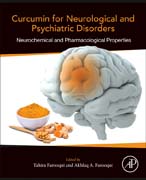
Curcumin for Neurological and Psychiatric Disorders: Neurochemical and Pharmacological Properties
Farooqui, Tahira
Farooqui, Akhlaq A.
Beneficial effects of curcumin have been observed both in cultured cells and in animal models. These observations have paved the way for ongoing present and future human clinical trials. Curcumin produces antioxidant and anti-inflammatory effects not only by blocking oxidative stress and neuroinflammation in neurotraumatic and neurodegenerative diseases, but also restoring cellular homeostasis and rebalancing redox equilibrium. Curcumin for Neurological and Psychiatric Disorders: Neurochemical and Pharmacological Properties focuses on different molecular mechanisms underlying curcumin-mediated beneficial effects in neurological diseases, which will help in developing new drugs to treat these chronic diseases. The editors discuss the neurochemical and pharmacological properties of curcumin, followed by the effect of curcumin in neurotraumatic diseases, neurodegenerative diseases, and neuropsychiatric diseases. The book also offers a perspective on future studies on the treatment of neurological disorders. Identifies molecular mechanisms of curcumin effects in neurological diseasesIncludes effects on neurotraumatic, neurodegenerative, and psychiatric diseasesCovers the anti-oxidant, anti-inflammatory, and immunomodulatory effects of curcuminExamines curcumin's potential in developing new therapeutic drugs INDICE: 1. Neurological and neuropsychiatric disorders 2. Curcumin: Historical background, chemistry, pharmacological action and potential therapeutic value 3. Curcumin in neurological disorders 4. Curcumin in neurological disorders: An overview 5. The potential role of curcumin in treatment and prevention for neurological disorders 6. The chemistry and biological activities of curcuminoids: Impacts on neurological disorders 7. Pharmacological effects of curcuminoids in neurological disorders 8. Anti-oxidant properties of curcumin: Impact on neurological disorders 9. Omics and epigenetics of polyphenol mediated neuroprotection: The curcumin perspective 10. Curcumin offers potential efficacy for treating Alzheimer's disease 11. Potential role of curcumin and its derivatives against Alzheimer Disease 12. Usefulness of curcumin analogs for the diagnosis and treatment of Alzheimer Disease 13. Potential therapeutic impacts of curcumin against age-related impaired cognition and memory 14. Potential therapeutic impacts of curcumin for improving memory impairment 15. Curcumin derivatives as metal-chelating agents: Implications for potential therapeutic agent for neurological disorders 16. Neuroprotective propensity of Curcumin: evidences in animal models; Mechanisms and its potential therapeutic value 17. Molecular mechanisms of action of curcumin and its relevance to some clinical conditions 18. Therapeutic potentials of curcumin in Parkinson's disease 19. Beneficial role of curcumin in preventing the aggregation of the Amyloid-? peptide in Alzheimer disease 20. Curcumin impact on multiple sclerosis 21. Potential therapeutic impacts of curcumin in treating epilepsy 22. The potential beneficial effects of curcumin in diabetic retinopathy 23. Current and combinative curcumin therapeutics for treating spinal cord injury 24. Curcumin and inflammatory brain diseases 25. Curcumin in depressive disorders 26. Summary, perspective and direction for future research
- ISBN: 978-0-12-815461-8
- Editorial: Academic Press
- Encuadernacion: Rústica
- Páginas: 350
- Fecha Publicación: 01/06/2019
- Nº Volúmenes: 1
- Idioma: Inglés
